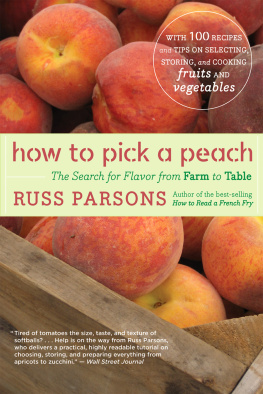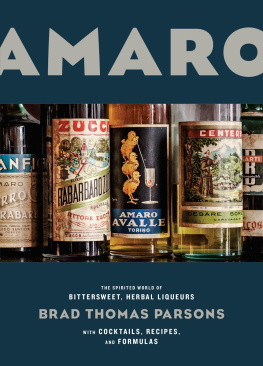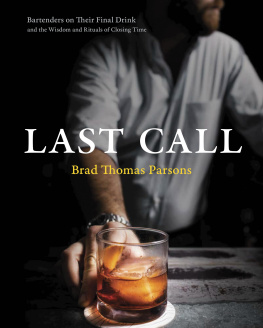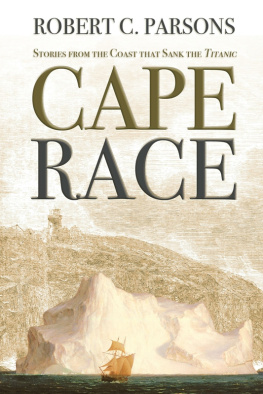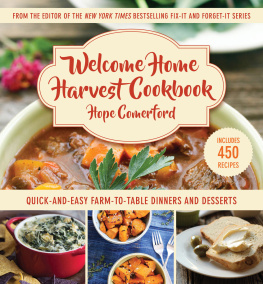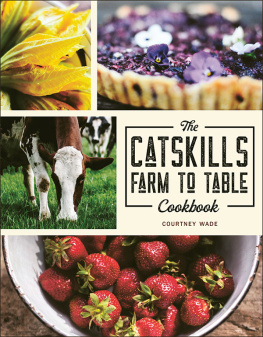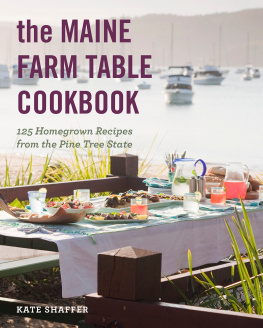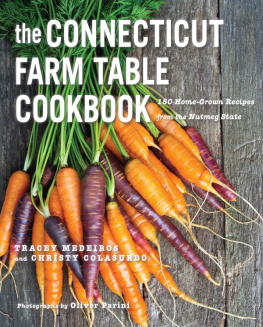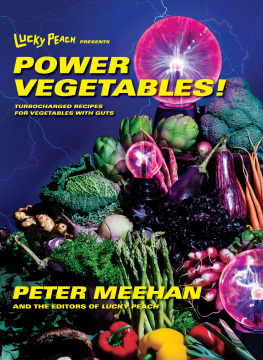Parsons - How to Pick a Peach The Search for Flavor from Farm to Table
Here you can read online Parsons - How to Pick a Peach The Search for Flavor from Farm to Table full text of the book (entire story) in english for free. Download pdf and epub, get meaning, cover and reviews about this ebook. City: Boston, year: 2008;2015, publisher: Houghton Mifflin Harcourt;Mariner Books, genre: Romance novel. Description of the work, (preface) as well as reviews are available. Best literature library LitArk.com created for fans of good reading and offers a wide selection of genres:
Romance novel
Science fiction
Adventure
Detective
Science
History
Home and family
Prose
Art
Politics
Computer
Non-fiction
Religion
Business
Children
Humor
Choose a favorite category and find really read worthwhile books. Enjoy immersion in the world of imagination, feel the emotions of the characters or learn something new for yourself, make an fascinating discovery.
- Book:How to Pick a Peach The Search for Flavor from Farm to Table
- Author:
- Publisher:Houghton Mifflin Harcourt;Mariner Books
- Genre:
- Year:2008;2015
- City:Boston
- Rating:5 / 5
- Favourites:Add to favourites
- Your mark:
- 100
- 1
- 2
- 3
- 4
- 5
How to Pick a Peach The Search for Flavor from Farm to Table: summary, description and annotation
We offer to read an annotation, description, summary or preface (depends on what the author of the book "How to Pick a Peach The Search for Flavor from Farm to Table" wrote himself). If you haven't found the necessary information about the book — write in the comments, we will try to find it.
How to Pick a Peach The Search for Flavor from Farm to Table — read online for free the complete book (whole text) full work
Below is the text of the book, divided by pages. System saving the place of the last page read, allows you to conveniently read the book "How to Pick a Peach The Search for Flavor from Farm to Table" online for free, without having to search again every time where you left off. Put a bookmark, and you can go to the page where you finished reading at any time.
Font size:
Interval:
Bookmark:
Copyright 2007 by Russ Parsons
All rights reserved
adapted from Postharvest Technology of Horticultural Crops, edited by Adel Kader, copyright 2002 by the Regents of the University of California, Division of Agriculture on Natural Resources.
For information about permission to reproduce selections from this book, write to Permissions, Houghton Mifflin Harcourt Publishing Company, 215 Park Avenue South, New York, New York 10003.
www.hmhco.com
The Library of Congress has cataloged the print edition as follows:
Parsons, Russ.
How to pick a peach : the search for flavor from farm to table / Russ Parsons.
p. cm.
Includes index.
ISBN-13: 978-0-618-46348-0; ISBN-10: 0-618-46348-8
1. Vegetables. 2. Fruit. 3. Cookery (Vegetables) 4. Cookery (Fruit) I. Title.
TX391.P37 2007
641.35dc22 2006035462
Ebook ISBN 978-0-547-34776-9
v1.0715
For all the talented farmers
who work hard
so we cooks dont have to
A book like this is the product of so many minds that its hard to know where to start in thanking them. Legions of people were incredibly generous with their time and knowledge, and any errors are undoubtedly the result of my misunderstanding and no fault of theirs. In this case, do blame the messenger.
Its only fitting to start with the farmers: Laura Avery, Joe Avitua, Ed Beckman, Maryann and Paul Carpenter, Jim Churchill, Bill Coleman, Vance Corum, the Gean-Iwamoto family, Lucio Gomiero, Jim Howard, Fitz Kelly, Art Lange, Marc Marchini, Mas Masumoto, Richard Matoian, Phil McGrath, Jon Rowley, the Tamai family, Tony Thacher, the Weiser family, the Zuckerman family.
And then, of course, the cooks: Gino Angelini, Michael Cimarusti, Josiah Citrin, Jim Dodge, Vincent Farenga and Nicole Dufresne, Mark Furstenburg, Alain Giraud, Suzanne Goin, John and Leslie House, Thomas Keller, Evan Kleiman, Eric Klein, David LeFevre, Deborah Madison, Drake McCarthy and Jeanne Laber, Mark Peel, James Peterson, Michel Richard, Michael Roberts, Judy Rodgers, Sonoko Sakai, Fred Seidman and Sherry Virbila, Lindsey Shere, Ken Shoemaker and Trudy Baker, Martha Rose Shulman, Nancy Silverton, Maria and Rob Sinskey, David Tanis, Paula Wolfert, Tim Woods, Clifford Wright, Pauline and Luciano Zamboni.
Ive learned something from almost every writer Ive ever read, but especially: Toni Allegra, Julia Child, Amy Goldman, Emily Green, Amanda Hesser, David Karp, Matt Kramer, Patric Kuh, Mike Madison, Harold McGee, Charles Perry, Ruth Reichl, Phyllis Richman, Michael Ruhlman, Elizabeth Schneider, David Shaw, Rod Smith, Jeffrey Steingarten, Steven Stoll, Sylvia Thompson, Anne Tyler, Richard Walker, Faith Willinger. And finally, the ever argumentative folks at eGullet, who never fail to give me something to think about.
There is a tremendous amount of academic work available on fruits, vegetables and agriculture in general, if you know where to look. Id especially like to thank: all the unsung workers at the Department of Agricultures Economic Research Service and National Agricultural Statistics Service, the University of California at Davis, Marita Cantwell, Carlos Crisosto, Kevin Day, Stephen Facciola, Julie Guthman, Adel Kader, Kirk Larson, Margaret McWilliams, Harry Paris, Mikeal Roose, Richard Lance Walheim, Michael Yang.
Ive been terrifically fortunate in my professional life to have worked with some of the best people around. At the Los Angeles Times: John Carroll and Dean Baquet, who took a dispirited newspaper and turned it into one of the best in the country; John Montorio and Michalene Busico, who gave me the best job in food journalism; Leslie Brenner for years of good editing; Donna Deane, Mayi Brady and Maryellen Driscoll for keeping the recipes straight; and all of the rest of the food staff, past and present.
Ive been just as fortunate in the book business. How to Read a French Fry was a dream come true for meall I wanted to do was write a good book, and I hoped it would sell well enough so my friend and editor Rux Martin wouldnt get fired. It did better than Id ever dreamed, and Id like to thank Rux (still working; still keeping the Post-it company in business), my agent Judith Weber, the publicist Deb DeLosa, the copyeditor Barb Jatkola and everybody else at Houghton Mifflin for making the impossible happen.
Finally, as always, for my girlies: Kathy and Sarah.
APPETIZERS AND FIRST COURSES
SOUPS
SALADS
MAIN DISHES
SIDE DISHES AND CONDIMENTS
BREAKFASTS
DESSERTS
If, as nineteenth-century French chef Antonin Carme so famously remarked, the cuisine of his day should have been most rightly regarded as a branch of architecture, todays culinary fashion would be much more likely to send every aspiring chef scurrying straight for the nearest college of agriculture. There has been a revolution in American kitchens as a whole generation of cooks has discovered the startling idea that a great dish can only be built on good ingredients. On the one hand, this is welcome, in fact overdue. For too long we have ignored where our food comes from and what it takes to grow it.
Too often, though, in our conversations, the complex issues of agriculture have been reduced to easy catchphrases: organics, crop subsidies, corporate farming, genetically modified organisms, agricultural-industrial complexoften by people who have never visited a farm (or even planted a backyard garden). These are repeated like mantras until, like all mantras, the actual words lose their meaning.
Eat local; eat seasonal. How many times have you heard it? Certainly, it seems like an idea that should have been obvious to us from the start. After all, it is exactly what all good cooks have done since time immemorial. If it now seems new, it is only because we have spent the last couple of generations trying to forget it. This wasnt so much a conscious effort as a slow accretion of bad habits encouraged by modernization. Comfort, ease, efficiency and economy are wonderful things in most cases, but their effect on cooking has been devastating.
At its heart, cooking is a primitive act and remarkably simple. You choose what seems tastiest, and then you try to make it better. Seems easy, right? Only until you try to do it yourself. Lets say you want to make a peach pie. You go to the store and buy some fruit. You pick the brightest, reddest ones and stick them in your cart. You take them home, peel them and slice them, and then sweeten them with a little sugar and dust them with a little spice. And then you taste them. Nothing. So you add more sugar and you add more spice. And then you do that again. And still it doesnt turn out the way you want. By the time you pull the pie from the oven, you might as well call it sugar-and-spice pie, because you sure cant taste any peaches. So what happened? There are many possible culprits, stretching from the tree the fruit was grown on to your home kitchen.
This book will examine some of the possibilities. It will help you sort through the fruits and vegetables you find in the market (both super and farmers), telling you how to select, store and prepare them. And it will shine a little light on some contentious issues by taking you right out to the fields and introducing you to the people involved.
The first thing you have to understand is that the whole idea of eating locally and seasonally is not based merely on some philosophical framework. It may indeed be good for the planet, but that is for greater minds to decideIm mainly interested in fixing a good dinner. And believe it or not, eating locally and seasonally is backed up by some very basic scientific principles.
Next pageFont size:
Interval:
Bookmark:
Similar books «How to Pick a Peach The Search for Flavor from Farm to Table»
Look at similar books to How to Pick a Peach The Search for Flavor from Farm to Table. We have selected literature similar in name and meaning in the hope of providing readers with more options to find new, interesting, not yet read works.
Discussion, reviews of the book How to Pick a Peach The Search for Flavor from Farm to Table and just readers' own opinions. Leave your comments, write what you think about the work, its meaning or the main characters. Specify what exactly you liked and what you didn't like, and why you think so.

